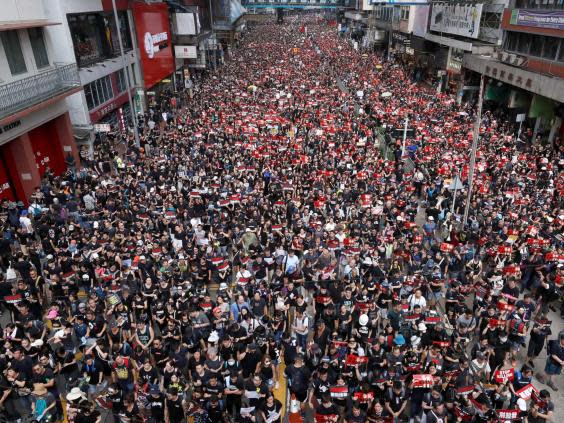Hong Kong protests: Tens of thousands march against extradition bill as activists demand Carrie Lam steps down
Tens of thousands of people have taken to the streets of Hong Kong to demand the territory’s leader Carrie Lam steps down, a day after she suspended a controversial extradition bill.
Protest organisers said they hoped more than a million people turn up for Sunday’s rally, as the crowds marched from Victoria Park towards the downtown district where government headquarters are located.
Dressed in black, pro-democracy demonstrators shouting “withdraw” and “resign” carried banners demanding the government scrap the proposed legislation that could send people to mainland China to face trial.
Ms Lam, Hong Kong’s Beijing-backed chief executive announced that the extradition bill would be indefinitely delayed on Saturday. Opponents said the bill's suspension was not enough and now want Ms Lam to go.
“Our demands are simple. Carrie Lam must leave office, the extradition law must be withdrawn and the police must apologise for using extreme violence against their own people,” said one protester John Chow.
The rally follows the death of a man who fell from construction scaffolding on Saturday as he unfurled a banner denouncing Hong Kong’s extradition bill, local media reported.
The Hong Kong protests have been the largest in the city since crowds came out against the bloody suppression of pro-democracy demonstrations centred around Beijing’s Tiananmen Square in June 1989.
Officials said 72 people were admitted to hospitals from a protest last week, which saw police fire rubber bullets and tear gas at protesters.
Some banks, including HSBC, were also forced to shut branches.
“I wasn’t going to come today, but when I saw what happened on Wednesday, Hong Kong people getting wrecked, that really hurt. So I decided to come down,” said protester Matt Chan on Sunday.
Ms Lam had argued that the extradition law was necessary to prevent criminals using Hong Kong as a place to hide and that human rights would be protected by the city’s court, which would decide on the extraditions on a case-by-case basis.
Critics have accused the government of threatening Hong Kong’s rule of law and its international reputation as a financial hub by proposing the changes to extradition with China.
Some Hong Kong tycoons have reportedly started moving personal wealth offshore.

The apparent climb-down by Ms Lam was one of the most significant political turnarounds by the Hong Kong government since Britain returned the territory to China in 1997, and it threw her leadership leadership.
Investor David Webb, in a newsletter, said if Ms Lam was a stock he would recommend shorting her with a target price of zero.
“Call it the Carrie trade. She has irrevocably lost the public’s trust,” Mr Webb said. “Her minders in Beijing, while expressing public support for now, have clearly lined her up for the chop by distancing themselves from the proposal in recent days.”
China’s Communist Party mouthpiece, the People’s Daily newspaper, said in a commentary that central authorities expressed “firm support” for Ms Lam.
Hong Kong has been governed under a “one country, two systems” agreement since its return to Beijing in 1997, allowing freedoms not enjoyed on mainland China but not a fully democratic vote.
The city’s independent legal system was guaranteed under laws governing Hong Kong’s return from British to Chinese rule, and is seen by business and diplomatic communities as its strong remaining asset amid encroachments from Beijing.
Additional reporting by agencies

 Yahoo News
Yahoo News 
